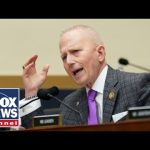Harvard astrophysicist Dr. Avi Loeb has publicly challenged NASA’s handling of the interstellar visitor 3I/ATLAS, warning that the object’s trajectory now places it where it could — in theory — release smaller objects influenced by Jupiter’s gravity. Loeb’s blunt assessment contradicts the comfortable consensus in parts of the scientific establishment and demands a straight answer from agencies that owe transparency to the American people. This isn’t timid speculation; it’s a call for responsible vigilance when an object from beyond our solar system behaves in unusual ways.
Loeb and colleagues have gone beyond talk and published a concrete plan showing how NASA’s aging Juno spacecraft could be retargeted with a Jupiter Oberth maneuver to intercept 3I/ATLAS in March 2026, offering a one-shot opportunity to study the object up close. Their proposal outlines specific thrust maneuvers and timing that could bring Juno into the comet’s path, using instruments already paid for by taxpayers to collect decisive data. If we’re serious about protecting this nation and pursuing truth, converting Juno’s mission into a targeted reconnaissance makes technical and fiscal sense.
Despite these proposals, NASA has maintained a conventional line, preparing to release images while publicly classifying 3I/ATLAS as a comet and downplaying more unsettling possibilities. That posture may placate comfortable career scientists, but it does not answer the hard questions Loeb and others have raised about atypical composition and trajectory anomalies. Americans deserve more than watered-down reassurances when even mainstream outlets report the agency’s reluctance to fully engage novel hypotheses.
Congressional voices have begun to press the issue, with Rep. Anna Paulina Luna joining calls for closer scrutiny and urging NASA to use available spacecraft to gather data — a sensible oversight role from elected representatives. This is government doing the job it’s supposed to do: insist on accountability and make sure taxpayer-funded assets are used to protect and inform the nation. Lawmakers pushing for transparency should be applauded, not smeared for asking questions when national security and public safety could be at stake.
It’s time to stop treating curiosity as a political liability and start treating it like the patriotic duty it is. Our institutions must be willing to pivot from pet theories and bureaucratic inertia to real-world action when credible scientists propose concrete, achievable plans. If a Harvard scientist and congressional oversight both say more should be done, we should do it — not hide behind jargon and bland press releases.
Hardworking Americans know common sense when they see it: use existing assets, gather the facts, and be transparent about risks and findings. We should demand that NASA and the scientific community stop reflexively dismissing inconvenient possibilities and start honoring the public trust with bold, open inquiry and full disclosure.




